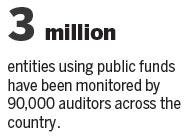Major overhaul of govt auditing set
Updated: 2015-12-10 07:59
By Zhang Yi(China Daily)
|
|||||||||||
China's top policymakers issued a guideline on Tuesday for building up an extensive auditing system by 2020 to facilitate the country's modern governance.
The document, jointly issued by the General Office of the Central Committee of the Communist Party of China and the General Office of the State Council, calls for efficient auditing mechanisms to be established that target the use of public funds and State assets, exploitation of State-owned resources and government officials' role in economic affairs.
The move is intended to safeguard national economic security, restructuring, the rule of law and clean governance, the document said. It also stressed the importance of the independence and supervision of the audit system.
Seven provinces and municipalities were selected this year to pilot the system - Jiangsu, Zhejiang, Shandong, Guangdong, Guizhou, Yunnan and Chongqing.
"China has a huge, unparalleled amount of State resources, and the size is growing," said Wang Yongjun, head of the Government Budget Research Center at Central University of Finance and Economics. Auditing of State-owned resources should be stepped up in the wake of the lack of auditing in this area for many years."
Without an efficient auditing system, it's hard to hold government officials accountable, he said.
According to the National Audit Office, 94 companies affiliated with ministries and other central government agencies had not been audited from 2008 to March this year.
During the same period, only 57 of the 118 companies under the supervision of the State Council and Ministry of Finance had been audited.

Deputy Auditor General Shi Aizhong said the overseas investments of State-run companies have never been audited due to a lack of related laws and regulations.
Because of personnel limitations, the National Audit Office could only carry out audits of companies under the supervision of central government departments every five years, Shi said.
Currently, there are about 90,000 auditors across the country to monitor 3 million entities using public funds, which suggests that the country's auditing staff is far short of the number needed to cover all the entities that should be audited, said Cai Chun, a professor of auditing at Southwestern University of Finance and Economics.
Under the newly issued guideline, the cycle and frequency of auditing will be nailed down, said Guo Caiyun, director of the policy research department at the National Audit Office, adding that the office will make sure to audit key entities annually.
"Officials of local Party committees and leading officials in local governments should be audited regularly, and they will be held accountable," Guo said.
zhang_yi@chinadaily.com.cn
Today's Top News
Unregistered citizens to finally gain recognition
Aging population could shrink workforce by 10%
China seeks advice of foreign experts on economic blueprint
Aging population could shrink workforce by 10% in China
Czech president warns of terrorist attack
EU members agree on bloc's first cyber-security law
Beijing issues first red alert for heavy air pollution
Dutch collector puts conditions on statue's return
Hot Topics
Lunar probe , China growth forecasts, Emission rules get tougher, China seen through 'colored lens', International board,
Editor's Picks

|

|

|

|

|

|






